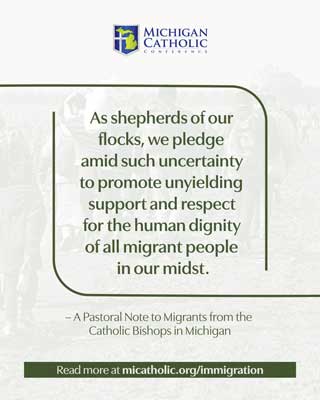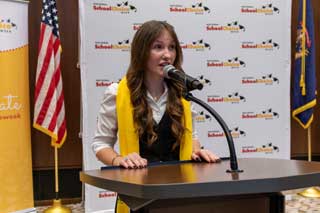Lansing Update: Why Catholic Education Was The Right Choice for This High School Senior
Posted January 31, 2025
Catholic Bishops in Michigan Pledge ‘Unyielding Support and Respect’ for All Migrant People
The ten Catholic bishops serving in Michigan have composed a Pastoral Note to Migrants expressing their fraternal closeness to and prayerful support of immigrants amid continued federal enforcement actions, which has caused fear and anxiety in the state’s immigrant communities.
“As shepherds of our flocks, we pledge amid such uncertainty to promote through the Michigan Catholic Conference and in our respective dioceses unyielding support and respect for the human dignity of all migrant people in our midst,” the ten bishops said in the joint statement that is being distributed to Catholic parishes and entities across the state through this weekend.

The bishops make clear their support for the human dignity of all people—particularly migrants at this time—and remind readers the Church’s concern for immigrants is rooted in the Gospel, where Christ calls His followers to welcome the stranger, because, “whatever you did for one of these least brothers of mine, you did for me” (Matthew 25:40).
While reform of the country’s immigration system has stalled at the federal level for many years, the bishops urge elected officials to “support policies that keep immigrant and undocumented families safe and united, and to protect those who arrived as children.”
The bishops also are calling on the Michigan congressional delegation “to work for a humane immigration system that welcomes refugees and immigrants by providing a fair pathway to citizenship; one that also keeps borders safe and secure from criminal activity, including human trafficking and the smuggling of illegal drugs.”
The bishops’ Pastoral Note includes a companion Frequently Asked Questions document that shares Catholic social teaching about immigration and the treatment of migrant people. The document clarifies that the Catholic Church does not support “open borders,” provides teaching from the Catechism of the Catholic Church about illegal immigration and undocumented migrants, and shares advocacy positions from the U.S. Conference of Catholic Bishops (USCCB) regarding federal immigration reform.
The document concludes by addressing why Catholics serve people who enter the U.S. without authorization: “Faithful to Jesus’ mandate to ‘welcome the stranger,’ Catholic-affiliated organizations provide basic human needs to migrants because all people are made in God’s image and likeness and inherently possess human dignity.”
Both the Pastoral Note and the companion Frequently Asked Questions document have been published in English and Spanish and can be found at www.micatholic.org/immigration. Parishes and other Catholic entities are encouraged to print PDF copies of the Pastoral Note and FAQ document or otherwise distribute the materials to the faithful through digital means.
The ten signatories on the Pastoral Note include bishops of the seven Catholic dioceses in Michigan and three auxiliary bishops who assist the archbishop of Detroit with administration and pastoral governance.
U.S. Bishops Respond to Immigration Orders, Address Federally Funded Refugee Program
On a national level, the USCCB is the Church’s voice on immigration policy, and in recent weeks, the USCCB has responded to executive orders pertaining to immigration enforcement actions.
Of particular concern to local Catholic parishes and agencies is the federal administration’s recission of guidance related to “protected areas” in immigration enforcement.
“Non-emergency immigration enforcement in schools, places of worship, social service agencies, healthcare facilities, or other sensitive settings where people receive essential services would be contrary to the common good,” the USCCB said in a statement issued Jan. 23. “With the mere rescission of the protected areas guidance, we are already witnessing reticence among immigrants to engage in daily life, including sending children to school and attending religious services.”
The USCCB reiterated that it recognizes “the need for just immigration enforcement and affirm the government’s obligation to carry it out in a targeted, proportional, and humane way.” The USCCB has also said that deportations and other enforcement actions should always be carried out with due regard for families, community ties, and religious liberty interests.
Ultimately, the U.S. bishops affirmed that the work of the Church to serve immigrants is based on the fundamental belief that “human dignity is not dependent on a person’s citizenship or immigration status.”
The U.S. bishops also issued a recent statement addressing its “long-time partnership with the federal government to serve refugees” after Vice President JD Vance made public comments that suggested the U.S. bishops serve migrants only to benefit financially from the federal grants the organization receives to conduct the work.
“In our agreements with the government, the USCCB receives funds to do this work; however, these funds are not sufficient to cover the entire cost of these programs,” the U.S. bishops said in a Jan. 26 statement. “Nonetheless, this remains a work of mercy and ministry of the Church.”
With the beginning of the new presidential administration and new congressional session, the USCCB in recent weeks has issued several statements in response to executive orders and legislation in addition to the ones already mentioned. To view these, click or tap here.
Why Catholic Education Was the Right Choice for This Lansing Senior
A Catholic high school senior provided an excellent witness to the benefits of Catholic education before dozens of guests—many of whom attend or work in secular schools—attending the National School Choice Week event at the state Capitol this week.
Brynn Anderson, a senior at Lansing Catholic, was invited to be among just a handful of speakers at the annual event to promote education choice, of which MCC is a sponsor. National School Choice Week this year also coincided with Catholic Schools Week.

Before a crowd of mostly secular school students and educators, Brynn—a 4.0 student athlete on Lansing Catholic’s state championship-winning golf team—shared about the values inherent in Catholic education at her school and at Catholic schools across the state.
Brynn said attending Lansing Catholic has allowed her to advance her education through participation in dual enrollment courses, which allows nonpublic high school students to obtain college credits. Supporting and preserving nonpublic schools’ ability to participate in dual enrollment is among MCC’s policy priorities before the Legislature.
The Lansing Catholic senior—who enjoys learning languages and has taken Latin, Ancient Greek, French and Japanese courses—said her high school has many strengths that she believes “reflect what parents are looking for when choosing the right school for their child.”
First, she said Lansing Catholic’s curriculum is grounded in the faith and the “entire staff is dedicated to modeling Christian values,” along with the school’s strong sense of community and rigorous academics.
Brynn also took note of the school’s safety measures, which she called a “tremendous relief to me” and “one of the many reasons why families should have the ability to choose an educational environment that best meets their child’s needs.” Ensuring nonpublic schools receive state support for improving security is also a top priority in MCC’s legislative advocacy regarding the state budget.
In related news this week, both chambers of the state Legislature adopted resolutions formally recognizing Catholic Schools Week. Sen. Joe Bellino (R-Monroe) and Rep. Kathy Schmaltz (R-Jackson) agreed to sponsor the resolutions in their respective chambers.
The resolutions recognized Catholic schools and their graduates for making a “positive contribution to society” and that “the common good of the state of Michigan is strengthened through the continued existence of Catholic schools.” The full text of the resolution can be found by clicking or tapping here.
